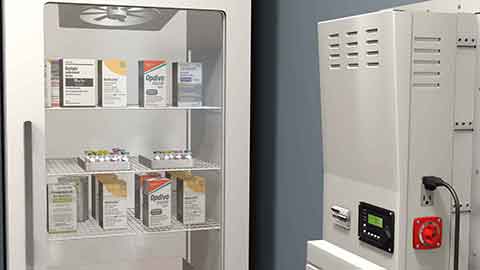October is Children's Health Month: The Critical Role of Reliable Backup Power in Pediatric Care
Each October, Children’s Health Month calls attention to the unique medical, social, and infrastructural challenges involved in protecting the health of children. For clinicians, administrators, and hospital leaders, it is an opportunity not only to emphasize preventive care but also to examine the systems that underpin effective pediatric practice. One of those systems — often overlooked until it fails — is the electrical infrastructure on which modern pediatric care depends.
Power Reliability as a Pediatric Safety Issue
The delivery of pediatric care today is inseparable from advanced technology. Neonatal intensive care units rely on incubators and warming systems that must remain continuously powered to maintain thermoregulation for premature infants. Children with acute or chronic respiratory conditions are supported by ventilators, CPAP devices, and nebulizers, all of which demand a constant electrical supply. Vaccine refrigerators and freezers safeguard fragile biologics that are central to immunization schedules, while electronic health record platforms give clinicians the real-time information necessary to make safe decisions for their patients.
When power is interrupted, even briefly, the consequences extend beyond inconvenience. Temperature excursions can undermine the efficacy of vaccines, forcing clinics to discard doses and delay scheduled immunizations. A ventilator that ceases operation during a blackout can turn a stable pediatric patient into a critical emergency in seconds. In a broader sense, a facility unable to maintain continuity erodes community trust — a cost that is harder to measure but just as damaging.
The Escalating Risk of Grid Instability
The vulnerabilities of the power grid are not hypothetical. Across the United States, outages have grown in both frequency and duration over the past decade, driven by aging infrastructure, surging demand, and more frequent climate-related weather events. Most power experts and analysts expect the upward trend to continue, with hospitals and clinics increasingly exposed to disruptions lasting hours or even days.
Pediatric environments are especially sensitive to such instability. Smaller clinics, urgent care centers, and rural hospitals often operate with minimal redundancy beyond a generator, if they have one at all. Even large urban facilities with more robust systems can experience dangerous gaps if switchover is delayed or if maintenance has lapsed. For any institution entrusted with the care of children, reliance on an unstable grid without effective backup is a risk that borders on negligence.
Beyond Generators: The Case for Seamless Backup
While diesel generators remain commonplace, they are far from an ideal safeguard in pediatric settings. Generators require time to start, which creates a vulnerable window for sensitive equipment. They demand fuel storage and regular testing, and their noise and exhaust can be disruptive to patients and staff.
In contrast, battery-based backup systems provide an instantaneous, silent transfer of power, ensuring there is no perceptible interruption in care.
These systems can be scaled to protect a single refrigerator or entire departments, offering flexibility to administrators who must balance safety with budgetary constraints. Their low maintenance profile further reduces the likelihood of failure when they are most needed. In practice, this means that when the power fails, vaccines remain viable, ventilators continue to function, and clinicians can remain focused on treatment rather than logistics.
Practical Implications in Pediatric Care
One of the clearest illustrations of the importance of reliable backup power lies in the vaccine supply chain. Vaccines are both indispensable and fragile. A single blackout can render an entire batch ineffective, leading not only to significant financial losses but also to real consequences for community health. Disrupted immunization schedules expose children to preventable disease outbreaks and undermine public confidence in healthcare delivery.
The same principle extends across the pediatric continuum. From neonatal care to outpatient treatment, reliable power enables continuity in environments where seconds can alter outcomes. Families place extraordinary trust in pediatric facilities, expecting that care will remain uninterrupted regardless of external conditions. When that expectation is not met, the failure is not simply infrastructural but moral.
Children’s Health Month: A Time for Infrastructure Review
Children’s Health Month serves as a reminder that protecting children’s health involves more than direct clinical interventions. It is also an invitation for healthcare leaders to scrutinize the infrastructure that sustains those interventions. This is the time to ask whether emergency power systems are adequate, whether they have been tested under real-world conditions, and whether they are sized correctly to protect the most critical functions of pediatric care.
Acknowledging the importance of backup power within this broader context reframes it from a facilities issue to a patient safety imperative. The question is not whether outages will occur, but whether pediatric institutions are prepared to withstand them without compromising the care of their youngest and most vulnerable patients.
A Shared Responsibility
Ultimately, the assurance of uninterrupted power is a collective responsibility shared across clinical and administrative domains. Physicians, nurses, and staff who rely on electrically powered devices have a direct stake in ensuring redundancy, while administrators must weigh the financial and reputational consequences of failure. Reliable backup power is no longer optional; it is integral to clinical excellence.
Medi-Products has developed battery backup systems specifically designed to meet these needs, offering a practical and immediate solution to a challenge that is only becoming more urgent. For healthcare leaders, integrating such systems represents a tangible step toward resilience — one that ensures that the mission of protecting children is not left vulnerable to the fragility of the electrical grid.
Children’s Health Month rightly draws attention to the importance of preventive care, wellness initiatives, and early intervention. Yet these efforts cannot succeed without infrastructure that guarantees continuity of care under all circumstances. Reliable backup power should be regarded as a core element of pediatric patient safety, equal in importance to vaccines, medications, and monitoring protocols.
In an era of increasing grid instability, the responsibility is clear. By equipping facilities with robust backup systems, healthcare leaders uphold the trust parents place in them and fulfill their commitment to the children they serve. When the power goes out, the standard of care must not.
To find out how Medi-Products can help you, schedule a free no-obligation consultation with one of our emergency backup power experts today, call 1.800.765.3237 or fill out the form below.


